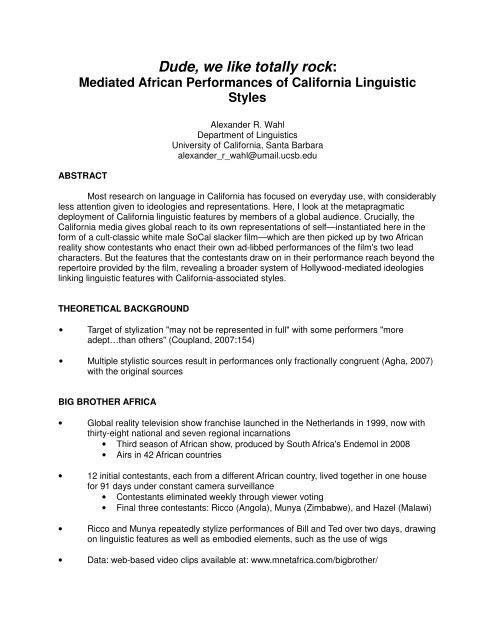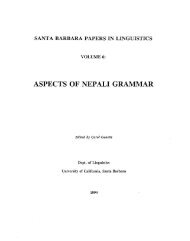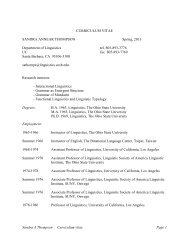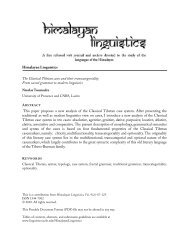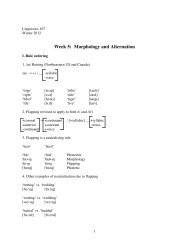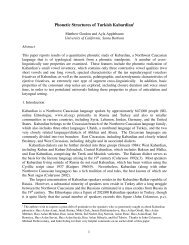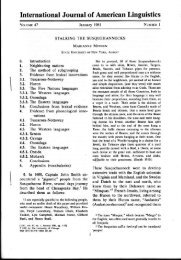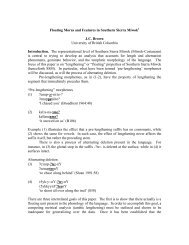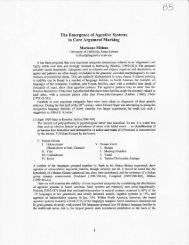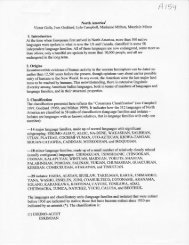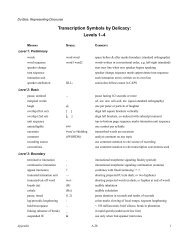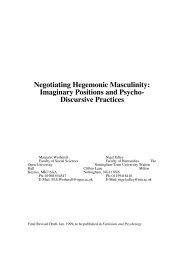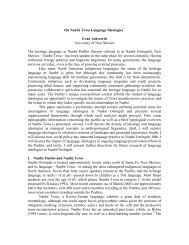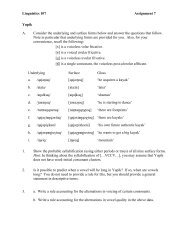vox poster handout - UCSB Linguistics - University of California ...
vox poster handout - UCSB Linguistics - University of California ...
vox poster handout - UCSB Linguistics - University of California ...
Create successful ePaper yourself
Turn your PDF publications into a flip-book with our unique Google optimized e-Paper software.
Dude, we like totally rock:<br />
Mediated African Performances <strong>of</strong> <strong>California</strong> Linguistic<br />
Styles<br />
ABSTRACT<br />
Alexander R. Wahl<br />
Department <strong>of</strong> <strong>Linguistics</strong><br />
<strong>University</strong> <strong>of</strong> <strong>California</strong>, Santa Barbara<br />
alexander_r_wahl@umail.ucsb.edu<br />
Most research on language in <strong>California</strong> has focused on everyday use, with considerably<br />
less attention given to ideologies and representations. Here, I look at the metapragmatic<br />
deployment <strong>of</strong> <strong>California</strong> linguistic features by members <strong>of</strong> a global audience. Crucially, the<br />
<strong>California</strong> media gives global reach to its own representations <strong>of</strong> self—instantiated here in the<br />
form <strong>of</strong> a cult-classic white male SoCal slacker film—which are then picked up by two African<br />
reality show contestants who enact their own ad-libbed performances <strong>of</strong> the film's two lead<br />
characters. But the features that the contestants draw on in their performance reach beyond the<br />
repertoire provided by the film, revealing a broader system <strong>of</strong> Hollywood-mediated ideologies<br />
linking linguistic features with <strong>California</strong>-associated styles.<br />
THEORETICAL BACKGROUND<br />
• Target <strong>of</strong> stylization "may not be represented in full" with some performers "more<br />
adept…than others" (Coupland, 2007:154)<br />
• Multiple stylistic sources result in performances only fractionally congruent (Agha, 2007)<br />
with the original sources<br />
BIG BROTHER AFRICA<br />
• Global reality television show franchise launched in the Netherlands in 1999, now with<br />
thirty-eight national and seven regional incarnations<br />
• Third season <strong>of</strong> African show, produced by South Africa's Endemol in 2008<br />
• Airs in 42 African countries<br />
• 12 initial contestants, each from a different African country, lived together in one house<br />
for 91 days under constant camera surveillance<br />
• Contestants eliminated weekly through viewer voting<br />
• Final three contestants: Ricco (Angola), Munya (Zimbabwe), and Hazel (Malawi)<br />
• Ricco and Munya repeatedly stylize performances <strong>of</strong> Bill and Ted over two days, drawing<br />
on linguistic features as well as embodied elements, such as the use <strong>of</strong> wigs<br />
• Data: web-based video clips available at: www.mnetafrica.com/bigbrother/
BILL AND TED<br />
• 1989 Hollywood sci-fi/comedy film released by MGM (and 1991 sequel “Bogus Journey”)<br />
• 2 white postadolescent male slackers-turned-musicians travel through time to study for a<br />
history exam.<br />
• Alex Winter (Bill) and Keanu Reeves (Ted) linguistically perform a <strong>California</strong> youth style<br />
Table 1: Examples <strong>of</strong> performed features <strong>of</strong> <strong>California</strong> youth style in the “Bill and Ted” films.<br />
Phonology Lexis Interactional<br />
Vowel fronting: dude, totally,<br />
know, good, no, most [=very],<br />
bodacious<br />
Vowel centralization: back,<br />
thanks<br />
dude, totally, party on,<br />
excellent, not bad, bodacious,<br />
bogus, no way, most [=very]<br />
simultaneous exclamations<br />
ANALYSIS: REPRESENTING BILL AND TED, PERFORMING CALIFORNIA<br />
1. “Spo<strong>of</strong>ing Bill and Ted” (0:31): Ricco and Munya begin their performance <strong>of</strong> Bill and Ted with a<br />
metapragmatic discussion <strong>of</strong> 'Ted's' use <strong>of</strong> totally, as well as a discussion <strong>of</strong> the quality <strong>of</strong> the<br />
marijuana they are pretending to smoke<br />
19 MUNYA; ^Dude_, you `need to stop saying [that ^wor:d, man].<br />
20 RICCO; [###]<br />
21 RICCO; ... What ^wor:d, ^ma:n,<br />
22 MUNYA; ... like, ^totally_,<br />
23 RICCO; Ok, ^totally_ cool, I'll ^totally stop.<br />
24 MUNYA; ... %^Totally_. <br />
25 … ^Fully_, ^bro_, <br />
26 RICCO; …(H)H ^Fully_
40 MUNYA; ^Dude_, he must ^totally_, ^like,<br />
41 .. ^sell this, but `like, I ^mean like,<br />
42 ... on `like a, on `like, a global ^scale? <br />
43 You ^know_, `like --<br />
44 RICCO ^du:de_],<br />
45 MUNYA; Let's like ^take, .. ^let's like, `start a ^business, ^man, <br />
46 RICCO; I go for that ^too, ^ma:n,<br />
47 [^To]tally:_ yeah: @:@: ^Awe:so[2:me] [3^Awe:so:me ^Y][4ea:h],<br />
48 MUNYA; [Like] -- [2^Aw:]so[3:me:] [4^Yea:h].<br />
<br />
49 ((THE TWO DO "HANG LOOSE" SIGN AND LOCK PINKIES))<br />
50 ... ^Pinky_.<br />
51 MUNYA; ^Dude_, .. cause `like, ... I ^feel like,<br />
52 ^people like, .. in ^Africa?<br />
53 ... You ^know_, .. like,<br />
54 my ^cousin was there,<br />
55 a couple ^days ago_ ,<br />
56 ... and `like, ... they ^totally_ need some ^shit_ like this,<br />
57 dude_.<br />
• Dude<br />
• Munya pronounces dude with <strong>California</strong> fronted (lines 27, 40, 51, 57) vowels<br />
• Munya pronounces dude with unmarked back (19) vowels<br />
• Totally<br />
• Munya pronounces totally with <strong>California</strong> fronted (22, 24) tonic vowels<br />
• Munya pronounces totally with unmarked back (40, 56) tonic vowels<br />
• Ricco pronounces totally with unmarked back (23, 47) tonic vowels<br />
• Other <strong>California</strong> surfer lexis<br />
• Munya frequently uses like (22, 40, 41, 42, 43, 45, 51, 52, 53, 56)<br />
• Munya pronounces fully (25) and bro (25) with fronted tonic vowels<br />
• Ricco pronounces fully (26) with unmarked back tonic vowel<br />
• Other words with fronted vowels<br />
• Munya pronounces know (43, 53) and ago (55) with fronted vowels<br />
• Munya uses rising final intonation for a declarative clause (42)<br />
• Both contestants use a raspy voice quality iconic <strong>of</strong> stoner-surfer practices<br />
• Ricco uses features indexical <strong>of</strong> African American English AAE<br />
• Lexis such as homey (32) and shit, dog (37)<br />
• Falling-rising intonation on shit, dog (37)<br />
• Ricco uses stylized rise-fall intonation over lengthened vowels (30, 32, 34) not<br />
transparently indexical <strong>of</strong> <strong>California</strong> surferhood or AAE
2. “Spo<strong>of</strong>ing Bill and Ted” (2:42): Munya and Ricco have told Hazel, now portraying Donna<br />
Summer, that they too are in a band, a noteworthy adherence to the script <strong>of</strong> the film. Hazel<br />
believes one <strong>of</strong> them looks an awful lot like John Lennon<br />
89 MUNYA; .. You know we're still ^practicing,<br />
90 RICCO; .. ^Totally_,<br />
91 MUNYA; .. But uh, we're going to blow ^up soon.<br />
92 HAZEL; (H) ^Bu:t, .. um, .. if you're still ^practicing, how ^come you've got,<br />
93 uh, John ^Lennon, ^with you, and still ^practicing?<br />
94 MUNYA; .. Nah, that's just a ^stage name, ^du@@@de_,<br />
95 RICCO; ##:, [#:].<br />
96 MUNYA; [@@], She- – She ^to[2tally_] thought [3you were `John ^Lennon,<br />
97 ^man],<br />
98 RICCO; [2##] [3@@:::]<br />
99 ^To:[4tally:_, @@@] ((RICCO AND MUNYA HIGH FIVE))<br />
100 MUNYA; [4^To:tally@_], Ye@a@@h.<br />
101 [5(H) Aw@@- --, Awe^so::me].<br />
102 RICCO; [5(H) Ah, cool, Awe^so::me], @@@=<br />
103 MUNYA; =@@@<br />
104 RICCO; … @@@<br />
105 MUNYA; That's ^totally_ <strong>of</strong>f the ^hook, man,<br />
• The two contestants simultaneously exclaim awesome (101, 102)<br />
• Laughter<br />
• Both contestants perform Bill and Ted’s laughter from the film (94, 99, 100, 101,<br />
102, 103, 104)<br />
• Munya places laughter within words (lines 94, 100, 101), indexical <strong>of</strong> this style<br />
• Munya uses the construction <strong>of</strong>f the hook (105)<br />
• The contestants deploy additional tokens <strong>of</strong> dude and totally (90, 94, 96, 99, 100, 105)<br />
3. “Spo<strong>of</strong>ing Bill and Ted” (3:23): Here, Munya invites 'Donna Summer' to go surfing with them<br />
117 MUNYA; … So you want to hit the ^waves some[2`time],<br />
118 RICCO; [2coo:l].<br />
119 HAZEL; … I'd ^love to do that.<br />
120 # #Awe:so:me=<br />
121 MUNYA; =^Swe[@e@t. .. ^Swe@e@@t].<br />
122 RICCO; [#####],<br />
123 ^To:tally_=, <br />
124 MUNYA; =^To:tally_, <br />
• Munya uses the term sweet with additional interposing <strong>of</strong> word-medial laughter (121)<br />
• Both contestants deploy additional tokens <strong>of</strong> totally (123, 124)
4. “Spo<strong>of</strong>ing Bill and Ted” (4:42): Munya complains to Ricco that his ears are itchy from the wig<br />
he is wearing to perform Bill<br />
171 MUNYA; [2my- – .. Dude_ my, .. Dude_ my] ^ears are `itchy.<br />
172 RICCO; [2#^Na::h, ^man, she was ^wicked, too:],<br />
173 MUNYA; #It #must #be #this fucking -- <br />
174 RICCO; U:h=<br />
175 MUNYA; =^Du:de_. Mm mm.<br />
176 RICCO; Maybe you should /^cut \i:t. <br />
177 (2.0) [@_((SUSTAINED LAUGHTER)) ###]<br />
178 MUNYA; [@_((SUSTAINED LAUGHTER))<br />
179 ^na@h dude_, ^na@h du:de_, .. ^na@@h]<br />
180 @@, @@=<br />
• Nah<br />
• Munya uses the negative particle nah in collocation with dude and by itself (179)<br />
• Ricco uses nah by itself (172)<br />
• Ricco uses the adjective wicked (172) meaning awesome<br />
• Both contestants deploy additional simultaneous exclamations: laughter (177, 178)<br />
• Munya deploys additional tokens <strong>of</strong> dude (171, 175, 179) while Ricco uses additional<br />
rise-fall intonation (176)<br />
5. “Dazed and Confused” (1:24): Ricco and Munya pretend to have misunderstood 'surfing the<br />
internet' for surfing waves, thus having attempted to ride waves on top <strong>of</strong> computer components:<br />
&<br />
1 RICCO; `Then there [was] this ^other one?<br />
2 HAZEL; [`Oh, ^yeah?]<br />
3 RICCO; [2called] ^mother, ^mother, huh [3^mother boa:rd]?<br />
4 MUNYA; [2Like uh:.] [3huh ^mother board]<br />
5 [4#I #don't ^know], dude_,<br />
6 HAZEL; [4^Hey ##]<br />
7 RICCO; [4She was supposed to be] the ^phattest one, ya know I ^mean? ((VERTICAL<br />
AXIS OPEN PALM REPEATED DOWNWARD GESTURE))<br />
• African American English<br />
• Ricco uses the construction ya know I mean (7)<br />
• Ricco uses the adjective phattest (7)<br />
• Munya uses an additional token <strong>of</strong> dude (5)<br />
6. “Pass the Courvoisier” (0:57): Munya and Ricco have just finished pretending to pass an<br />
invisible soccer ball back and forth using their laps, and, upon completion, they congratulate<br />
each other, briefly breaking into their Bill and Ted personae to do so
1 RICCO; \/^Per%\fe:::ct. … \/^Awe%\so:::me=.<br />
2 MUNYA; =^Awesome, `dude_.<br />
3 RICCO; `Du:de_.<br />
4 MUNYA; `Dude_, we ^totally_ ^rock. <br />
5 … Ah%. `Nigga's are ^crazy.<br />
• Ricco uses a stylized fall-rise-fall intonation (1) that triggers Munya’s switch into a<br />
performative frame<br />
• Munya uses the verb rock in collocation with totally (4) to signify be awesome<br />
• Munya utters Nigga’s are crazy (5), indexing AAE, though this may fall outside the<br />
performative frame<br />
• Both contestants deploy additional tokens <strong>of</strong> dude (2, 3, 4)<br />
ANALYTIC SUMMARY<br />
• Munya and Ricco portray themselves as “surfers,” although Bill and Ted were not<br />
• Munya deploys numerous <strong>California</strong> youth style features from the film and from other<br />
sources, in addition to features indexing AAE<br />
• Ricco relies more heavily than Munya on features indexing AAE, but he also uses<br />
stylized features not obviously from either AAE or <strong>California</strong> youth<br />
• Ricco and Munya thus differently achieve Bill and Ted by drawing on varied features only<br />
fractionally congruent with the performances in the movie<br />
• The constestants’ ideologies nonetheless indexically link these features to a <strong>California</strong>centered<br />
surfer style, which is what, for them, Bill and Ted are fundamentally ‘about’<br />
CONCLUSION<br />
• Mass media has enabled the appropriation <strong>of</strong> <strong>California</strong> styles by global audiences<br />
• Locally relevant distinctions between styles, entextualized enactments <strong>of</strong> styles, and<br />
their constitutive features may be erased in this process <strong>of</strong> mediated global appropriation<br />
REFERENCES<br />
Agha, Asif. 2007a. Language and Social Relations. Cambridge: Cambridge <strong>University</strong> Press.<br />
Agha, Asif. 2007b. "Recombinant selves in mass mediated spacetime." Language &<br />
Communication. 27: 320-335.<br />
Coupland, Nikolas. 2007. Style: Language Variation and Identity. Cambridge: Cambridge<br />
<strong>University</strong> Press.


